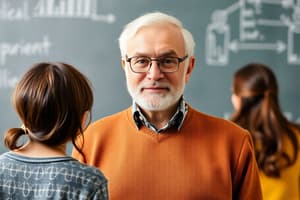Podcast
Questions and Answers
What is the primary focus of the 'Principles of Learning' in the context of cognitive learning theory?
What is the primary focus of the 'Principles of Learning' in the context of cognitive learning theory?
The primary focus is on the Processes of learning, which are closely aligned with the social learning theory.
What is the first stage in the 'Processes of Learning' in social learning theory?
What is the first stage in the 'Processes of Learning' in social learning theory?
The 'Attentional' process, where humans learn from a model by recognizing and paying attention to it.
How does the environment influence learning in social learning theory?
How does the environment influence learning in social learning theory?
The environment influences learning by providing a model that can be observed and imitated, with the model's influence dependent on how well the individual remembers the model's actions.
What is the relationship between the learning curve and the 'Retention' process in social learning theory?
What is the relationship between the learning curve and the 'Retention' process in social learning theory?
What is the final stage of the 'Processes of Learning' in social learning theory?
What is the final stage of the 'Processes of Learning' in social learning theory?
How do the 'Principles of Learning' relate to the cognitive learning theory?
How do the 'Principles of Learning' relate to the cognitive learning theory?
What is learning defined as according to Ambrose et al. (2010)?
What is learning defined as according to Ambrose et al. (2010)?
What is the purpose of 'Learning Principles' in the learning process?
What is the purpose of 'Learning Principles' in the learning process?
What is cognition defined as?
What is cognition defined as?
What is the primary focus of learning according to the Cognitive Learning Theory?
What is the primary focus of learning according to the Cognitive Learning Theory?
How does the cognitive basis of learning differ from the biological approach?
How does the cognitive basis of learning differ from the biological approach?
What is the role of observation in the learning process according to Social Learning Theory?
What is the role of observation in the learning process according to Social Learning Theory?
What is the significance of learning being 'transferrable to the job'?
What is the significance of learning being 'transferrable to the job'?
What aspect of learning is reflected in the changes in attitude and behavior?
What aspect of learning is reflected in the changes in attitude and behavior?
What is the Environmental Perspective on learning?
What is the Environmental Perspective on learning?
What is the role of 'Principles of Learning' in skill-building programs?
What is the role of 'Principles of Learning' in skill-building programs?
What is the significance of the Learning Curve in the learning process?
What is the significance of the Learning Curve in the learning process?
What are the two types of experience involved in the learning process?
What are the two types of experience involved in the learning process?
How does the learning process involve the internal events between a stimulus and behavior?
How does the learning process involve the internal events between a stimulus and behavior?
What are the three main principles of learning?
What are the three main principles of learning?
What is the goal of the learning process?
What is the goal of the learning process?
What is the definition of learning?
What is the definition of learning?
Flashcards are hidden until you start studying
Study Notes
Principles of Learning
- The principles of learning are derived from social learning theories and are presented in five categories: Organization and Structure of Subject Matter, Motivation, Reward and Reinforcement, Techniques of Instruction, and Transfer of Learning.
- These principles are closely aligned with social learning theory and consist of the Attentional, Retention, and Reproduction processes.
Attentional Process
- Humans learn from models when they recognize and pay attention to attractive and repeatedly available models, even after the model is no longer available.
Retention Process
- The influence of models depends on how well the individual remembers the model's actions, even after the model is no longer available.
Reproduction Process
- After observing a model, the watching must be converted to doing.
Definition of Learning
- Learning is a process that leads to change as a result of experience, which increases the potential for improved performance and future learning.
- Learning can occur in knowledge, attitude, or behavior.
Cognition Process
- Cognition refers to the mental action or process of acquiring knowledge through thought, experience, and the senses.
- Cognition involves the mental processes relating to the input and storage of information and how that information is used to guide one's behavior.
Psycho-Social Learning
- Studying cognition includes language use, visual cognition, problem-solving, and reasoning.
- Social psychology topics include social cognition, attitude and group behaviors, social influences, prejudice, interpersonal attraction, and stress and coping.
Learning Processes
- Learning can occur through cognitive learning, observational learning, classical conditioning, and operant conditioning.
Characteristics of Learning
- Learning is an experience that cannot be measured.
- The emphasis is on how we learn rather than what we learn.
- Learning aims to bring about changes in attitude, behavior, and the acquisition of skills through direct experience and indirect observation.
Studying That Suits You
Use AI to generate personalized quizzes and flashcards to suit your learning preferences.



